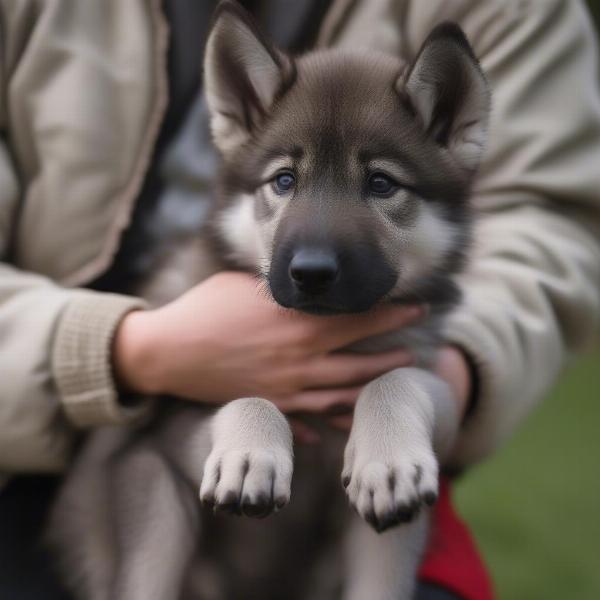Blue wolf dogs, often sought after for their striking appearance, are a complex topic. Understanding the realities of owning a wolfdog, whether it has blueish fur or not, is crucial before considering a purchase. This guide explores the intricacies of finding a blue wolf dog for sale, covering ethical considerations, legal restrictions, and the unique challenges of wolfdog ownership.
Understanding the “Blue” in Blue Wolf Dog
The term “blue” in blue wolf dogs usually refers to a diluted black coat, appearing grayish or bluish-gray. It’s important to understand that this doesn’t denote a separate breed. Wolfdogs themselves are not a recognized breed, but rather hybrids of wolves and domestic dogs. The “blue” simply describes the coat color. Finding a breeder specifically advertising “blue” wolfdogs can be challenging, as coat color is often secondary to temperament and health.
Legalities and Ethics of Owning a Wolfdog
Owning a wolfdog comes with significant legal and ethical responsibilities. Laws regarding wolfdog ownership vary dramatically by location. Some areas outright ban them, while others require permits or impose specific restrictions. It’s essential to research and fully understand your local laws before searching for a blue wolf dog for sale. Ethically, owning a wolfdog requires careful consideration. They are not domesticated animals and possess instincts that can make them challenging pets, even for experienced dog owners.
Finding a Reputable Breeder
If you’ve researched the legalities and ethics and are prepared for the commitment, finding a reputable breeder is paramount. A responsible breeder will prioritize the health and well-being of their animals. They will be knowledgeable about wolfdog behavior and genetics, and willing to answer your questions thoroughly. Beware of breeders who focus solely on appearance or make unrealistic promises about temperament.
Preparing for a Wolfdog: Beyond the Blue Coat
The unique needs of wolfdogs extend far beyond their coat color. Their diet, enrichment, socialization, and veterinary care differ significantly from domestic dogs. They require extensive space, specialized fencing, and a deep understanding of their complex social dynamics. Be prepared to invest significant time, resources, and effort in meeting these needs.
What to Ask a Wolfdog Breeder
When contacting a breeder, ask about the wolfdog’s parentage, health testing, socialization history, and temperament. Inquire about their experience with wolfdogs and their commitment to responsible breeding practices. A reputable breeder will welcome your questions and provide detailed answers. Never purchase a wolfdog from a breeder who avoids these discussions or pressures you into a quick sale.
 Wolfdog Puppy with Breeder
Wolfdog Puppy with Breeder
Conclusion
Acquiring a blue wolf dog for sale is a significant undertaking. It’s not simply about finding a visually appealing animal, but about understanding and respecting the complex nature of these captivating creatures. Thorough research, responsible breeding practices, and a commitment to meeting their unique needs are essential for a successful and ethical ownership experience.
FAQ
- Are blue wolf dogs rare? While the blue coat color is less common than other wolfdog coat colors, rarity depends on the specific wolfdog content and breeding lines.
- How much does a blue wolf dog cost? Prices can vary greatly depending on the breeder, lineage, and coat color. Expect a significant investment.
- Are wolfdogs legal in my state? Wolfdog legality varies widely. Research your local laws thoroughly before considering ownership.
- What kind of enclosure does a wolfdog need? Wolfdogs require secure, spacious enclosures with reinforced fencing designed to contain them safely.
- Are wolfdogs good family pets? Wolfdogs are not suitable pets for most families due to their complex needs and potential behavioral challenges.
- Where can I find a reputable wolfdog breeder? Research breeders carefully, looking for those prioritizing health, temperament, and ethical practices. Consult wolfdog rescue organizations for potential referrals.
- What should I feed a wolfdog? Wolfdogs require a diet that reflects their wild ancestry, often consisting of raw meat, bones, and other appropriate supplements.
Introducing ILM Dog
ILM Dog is your trusted source for comprehensive information on dog care and breeds. We provide expert advice on everything from puppy care to senior dog health, including breed selection, training, nutrition, and more. We understand the unique challenges and rewards of dog ownership and strive to equip our readers with the knowledge they need to provide the best possible care for their canine companions. For expert guidance on choosing the right breed for your lifestyle, contact us via email at [email protected] or call us at +44 20-3965-8624.